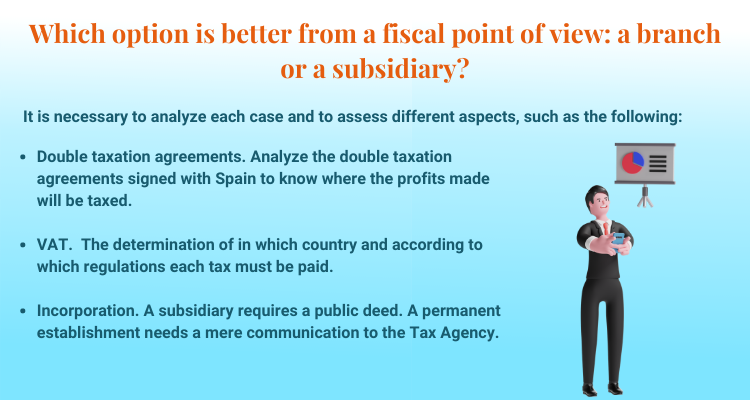STED ON BY PAUL URRUTIA

Do you want to set up a company in Spain? You should know that within the European Union you can operate in any country without the need to apply for a special permit. Therefore, the first thing to do is to decide what legal form the company must have and, for this, it is necessary to analyze the tax advantages there are for a subsidiary and for a permanent establishment in Spain.
What is a permanent establishment?
The first thing to know is that the concept of permanent establishment is used only in the tax field, and it allows a State to tax the income a foreign company has earned in Spain.
Due to the several international double taxation treaties, Spain can only tax the profits made by a non-resident company if it has a permanent establishment in the country.
The Tax Agency defines a permanent establishment as the place where a natural or legal person carries out their economic activities, and they have in that same location, on a continuous or regular basis, facilities or workplaces of any kind. It is the place where all or part of the activity is carried out, or is acted upon by an agent authorized to contract, in the name and on behalf of the non-resident, who exercises such powers regularly.
In particular, the following places are considered as permanent establishments: branches, factories, head offices, offices, stores, quarries and agricultural, forestry or livestock farms, among others.
It is important to know that a permanent establishment does not have its own legal personality. However, it must comply with the tax obligations that have been legally established, such as the filing of the corporate income tax (form 200) with a series of peculiarities set in relation to the income of non-residents. In this regard, it is important to mention that Article 18 of the Non-Resident Income Tax Law establishes that:
- For the designation of the taxable base, one can not deduct the payments the permanent establishment makes to the headquarters, or to any of its permanent establishments, in concept of royalties, interests or commissions for technical assistance services or for the use of the assignment of goods or rights.
- When defining the taxable income, one will be able to deduct the reasonable part of the management and general administrative expenses corresponding to the permanent establishment, provided that a series of requirements are met:
- Possession of the accounting statements of the permanent establishment.
- Evidence, by means of an informative report presented with the declaration of the amounts, criteria and allocation modules.
- Rationality and continuity of the allocation criteria adopted.
In addition, it is necessary to notify its existence to the Tax Agency in order to obtain a NIF number.
What is a subsidiary?
A subsidiary is a commercial company incorporated under Spanish law that is fully or partially owned by a foreign company. It has its own legal personality, different from that of the foreign company that owns it.
In order to set up a subsidiary, it is necessary to present a public deed of incorporation and to register it in the Commercial Registry. You must also file the books and annual accounts in said registry.
The great advantage of a subsidiary is that, since it is a company legally independent from the parent company, the risk of the foreign parent company is limited. In addition, from a tax point of view, the parent company can decide whether it prefers to tax the profits in Spain or to include them in the taxable income of its country.
Which option is better from a fiscal point of view: a branch or a subsidiary?
In order to come up with an answer, it is necessary to analyze each case and to assess different aspects, such as the following:
- Double taxation agreements. As we have mentioned before, it is important to analyze the double taxation agreements signed with Spain to know where the profits made will be taxed.
- VAT. Another important aspect to analyze is the VAT and indirect taxes, since the place where the taxable event takes place is fundamental in the determination of in which country and according to which regulations each tax must be paid.
- Incorporation. The incorporation of a subsidiary requires a public deed since it is a commercial company, whereas in the case of a permanent establishment a mere communication to the Tax Agency is enough, which means that there are no other formalities to comply with.
On the other hand, it is necessary to consider aspects such as liability. In the case of the subsidiary, the liability is limited, whereas in the case of the permanent establishment the parent company is liable.
To conclude, it is necessary to have the help of a business consultancy expert when setting up companies in Spain, which will study your case in depth and offer you the experience and knowledge of experts in taxation and incorporation of subsidiaries and permanent establishments.
Leialta website: https://www.leialta.com/en/
Blog for doing business in Spain: https://www.leialta.com/en/blog-for-doing-business-in-spain/
Linkedin: https://www.linkedin.com/company/leialta-s-l-/mycompany/

